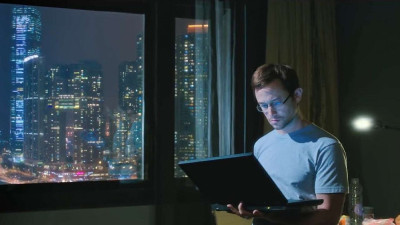Review: Snowden

Oliver Stone’s Snowden does not attempt to create a balanced picture of the NSA whistleblower – it treats him, straightforwardly, as a hero, a conservative patriot who finds himself forced to blow the whistle on the US government’s mass surveillance apparatus. This is a movie that takes a side. It does this explicitly by letting Snowden play himself briefly towards the end.
Based on all the facts I’ve seen, this treatment seems close to the truth and therefore doesn’t bother me – false balance, on the other hand, can distort the truth. The Economist, for example, writes in a critique of the film: “It is well documented that the real-life Mr Snowden declared his love for his Walther P22, his disgust with the vibrant, varied Muslim population of east London…”
What? Out of thousands of comments on messageboards and IRC over several years, you want to pick out the one set of throwaway comments most likely to offend the readership of the Economist to create a more “balanced” portrait of the man? The movie does portray Snowden as a conservative and a libertarian fan of Ayn Rand, and that seeems, at a high level, a reasonable summary.
As a movie, Snowden works well. Joseph Gordon-Levitt does a remarkable job portraying different sides of the character: Ed Snowden’s earnest search for a meaningful role in government, moments of pure whimsy with his girlfriend (played by Shailene Woodley), the many ethical challenges he encounters in his work, and the liberating moment when he walks out of an NSA facility in Hawaii with a stash of government documents. JGL is a joy to watch in this role.
To me, the weakest moments of the film were the interactions between Snowden and the fictional character Corbin O’Brien (played by Rhys Ifans and named after Winston Smith’s antagonist in Ninteen Eighty-Four). O’Brien is a cartoon villain, and even acts like one in a scene with a giant screen meant to evoke George Orwell. This would all be fine in a fictional tale about surveillance; here it distracts from the authenticity of the story.
On the substance, one important thing that Snowden gets right is that terrorism provides the necessary pretext for mass surveillance, but it is already used for many other purposes, including economic and political espionage and sabotage. And in a chilling moment, Snowden reminds us that this infrastructure creates the conditions for “turnkey tyranny” under an authoritarian presidency.
Snowden clocks in at 137 minutes and would have benefited from some more editing across the board (as cool as it is to have Nicolas Cage in the movie, it’s not clear that his character adds much to the overall arc, for example).
Overall, I recommend watching the film – it’s obviously not a documentary, but it does a good job explaining why Snowden did what he did, and why we should all be grateful for his revelations.
